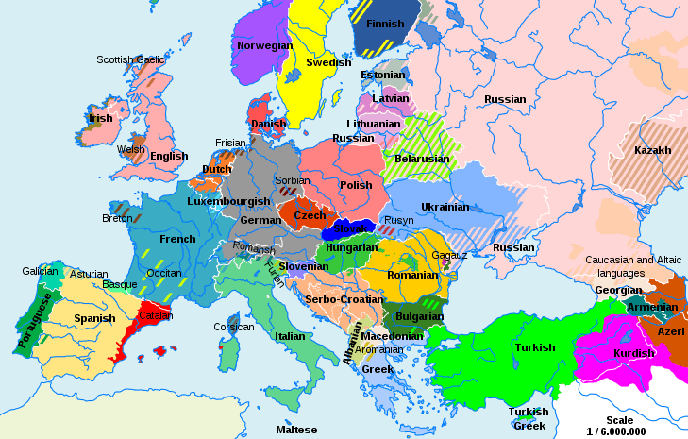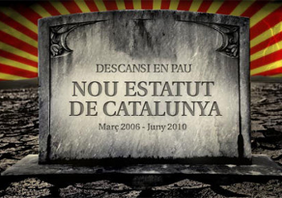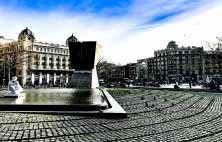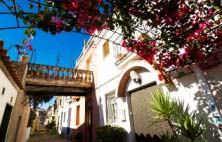Few people can deny that the Catalan Independence movement has grown from a minor political movement to one of largest calls for social and political change in Europe today. All that is happening right here and now in Catalonia was not foreseeable five or six years ago. But something has happened... and continues to happen.
On September 11th, more than 1,500,000 people joined hands in a human chain spanning over 400 kilometres in a call for independence. The day passed completely peacefully with thousands of families enjoying the event, most with the hope of seeing their dream fulfilled; an independent Catalonia.
In the historical memory of the Catalan population, there is an awareness of having previously enjoyed 700 years of independence. On the National Day of Catalonia, people commemorate the Fall of Barcelona, which happened on 11th September 1714 after a 14 month siege on the city and more than 21,000 dead or wounded. The result being abolition of many Catalan constitutions. Until this point, Catalonia had retained jurisprudence, as well as fiscal and monetary powers of its own.
Independence has already happened in Zagreb (Croatia), Bratislava (Slovakia), and Kiev (Ukraine)... In light of recent events, it's highly likely that the headline of this article will also be the headline on many newspapers in the future. It's a question of time: One year? Five years? A decade?

For anyone who wonders why: There are five pillars that have given rise to this political movement calling for independence.
- The constant attack on the Catalan Language.
- The attitude from Spain about the Catalan political system.
- The fiscal exploitation from a state that for years has hidden its financial balances.
- The recession and mismanagement of public money.
- The new policy of centralization of the Spain.
This article covers the first two. Part two will cover the other three.
The attack on the Catalan Language
The Catalan Language can be traced back to the 9th century, in an area located between the Frankish Empires (an area similar modern France) and Iberic portion of the Arabic Empires (an area similar to Modern Spain). During the Middle Ages, the catalan counts began to reconquer parts of Valencia and Mallorca, where Catalan is still spoken today.
Centuries later, Catalan eventually became the language of Mediterranean commerce (15th century), but since 1714 and until today, the language had been marginalized and legally persecuted time and time again.

The most recent attack on Catalan took place not so long ago and caused much of the Catalan educative community to stand up against it.
The right-wing political party that governs Spain is the Partido Popular (People's Party ...*ahem*...). This party has approved an education reform that will end the "linguistic normalization" that Catalan schools (includinginternational schools following the Spanish National Curriculum) have tried to practice since democracy was restored in Spain 40 years ago.
The justification is as follows:
- Catalan students do not know Spanish. A fairly weak argument considering grades in the Spanish language in Catalonia exceed the national average.
- There are Catalan families that want their children to be educated in Spanish. However, there have only been 17 families from 7.7 million people that have formally requested this.
If you come to visit the capital of Catalonia, we will help you to find the best apartments for rent Barcelona. We offer apartments of different types, renovated and well furnished in all areas of Barcelona!
Furthermore, in the Spanish media, there has been much sensationalism about what is happening regarding this subject in Catalonia. For example; Intereconomia and Telemadrid have made some documentaries on rather shoddy factual foundations that would lead many into believing that Catalans will go as far as persecuting and torturing people that speak in Spanish.
2. Lack of mature dialogue from Spain
The current standing of the politics in Spain is unbearable for many Catalans. There are a variety of issues in this regard that are bolstering the independence call, here are a few of them.
The Statute of Autonomy 2005
After painstakingly long negotiations on 30th September 2005, the Catalan Parliament agreed by a large majority to implement a new Statute of Autonomy, which aimed for a higher level of self-governance. This statute was approved by the then left-wing government after some modifications, although the new version was weaker, it was approved by 74% of Catalans through a democratic public referendum.

The current government (Partido Popular), took the time to challenge the statute in the Constitutional Court, and after four years of discussions, the Court put an end to the hopes of many, deeming 14 of the most important articles in the statute to be unconstitutional.
This eventually provoked various large-scale demonstrations amongst Catalans, who took to the streets on multiple occasions, with momentum picking up and eventually culminating in the massive manifestation that stole headlines of international media on 11th September 2012, with over 1,500,000 participants and one of the clearest calls for independence we have seen yet in Europe. With Scotland having been approved shortly before for their own referendum on independence and Catalonia outright rejected; the world noticed.
Independent finances or fiscal pact
In Spain there are currently two regions with their own financial management and an economic agreement that favours them greatly: The Basque Country and Navarra.
These communities have a historical and cultural personality different from the rest, much like Catalonia, which has called a countless number of times for similar treatment. The fact is, Catalonia never saw independence as a primary objective, the people simply want fair treatment on the same level as these regions.
A referendum for self-determination
Before 2014 passes us by, the world will know the public opinion of Scotland on a referendum that asks one simple yes or no question "Should Scotland be an independent country?". At the same time one can find Quebec, in Canada; has already been given the right to a similar consultation to that of Scotland.
The right to self-determination is at the heart of these nation's constitutions, but not only that, it forms a large part of modern international politics, found in documents like the Charter of the United Nations and various international human rights pacts.
It has reached a point in that the Catalan people wish to determine their future in a democratic and peaceful nature. The only response to this from Spain has been that it is against the Spanish Constitution, citing paragraphs from an outdated document that doesn't stand up to modern politics. Basing a position of rigidity on a constitution is undemocratic; many countries like the USA update older constitutions to suit the modern political landscape. If constitutions had remained unchanged, many countries today wouldn't even allow women to vote and slavery would still be permitted.

Spain is a very young democracy at only 40 years old, and demonstrates this clearly to the world in that it is incapable of dealing democratically with issues such as the right to self-determination. Meanwhile the political class entertains themselves in a landscape full of corruption, unable to take anything seriously, even the president, Rajoy, once told a teenager who asked to see his manifesto via twitter "15 years old? Let's wait a bit before debating politics? Thanks." and responding to questions about his own corruption with statements like "Everything is a lie, except for some of it...".
Documentary
The relatively unknown British journalist, Gary Gibson, interviewed various Catalan and Spanish personalities to speak about the cultural and economic conflict between Catalonia and Spain to try to understand why many Catalans are calling for independence.
The video received 8000 hits in just 2 days... on Vimeo, the "other" video website.
Even based on these two points alone, Catalonia is strongly heading towards being an independent state. How will it get there? Peacefully? What kind of resistance will further calls of independence meet? Will independence even happen? Let me know what you think yourselves!
Excursions in Barcelona
To make the most of Barcelona and fill your trip with unforgettable experiences and emotions, we offer you the excursions through the Catalan capital organized by our friends - the GetYourGuide team. Choose your excursion and fall in love with Barcelona:










